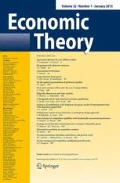Abstract
We analyze infinite-horizon choice functions within the setting of a simple technology. Efficiency and time consistency are characterized by stationary consumption and inheritance functions, as well as a transversality condition. In addition, we consider the equity axioms Suppes–Sen, Pigou–Dalton, and resource monotonicity. We show that Suppes–Sen and Pigou–Dalton imply that the consumption and inheritance functions are monotone with respect to time—thus justifying sustainability—while resource monotonicity implies that the consumption and inheritance functions are monotone with respect to the resource. Examples illustrate the characterization results.
Similar content being viewed by others
References
Asheim G.B.: Unjust intergenerational allocations. J Econ Theory 54, 350–371 (1991)
Asheim G.B., Buchholz W., Tungodden B.: Justifying sustainability. J Environ Econ Manag 41, 252–268 (2001)
Asheim G.B., Mitra T., Tungodden B.: A new equity condition for infinite utility streams and the possibility of being Paretian. In: Roemer, J.E., Suzumura, K.(eds) Intergenerational Equity and Sustainability., pp. 55–68. Basingstoke, Palgrave-Macmillan (2007)
Asheim G.B., Tungodden B.: Resolving distributional conflicts between generations. Econ Theory 24, 221–230 (2004)
Basu K., Mitra T.: Aggregating infinite utility streams with intergenerational equity: the impossibility of being Paretian. Econometrica 71, 1557–1563 (2003)
Basu K., Mitra T.: Utilitarianism for infinite utility streams: a new welfare criterion and its axiomatic characterization. J Econ Theory 133, 350–373 (2007)
Bossert W., Sprumont Y., Suzumura K.: Consistent rationalizability. Economica 72, 185–200 (2005)
Bossert W., Sprumont Y., Suzumura K.: Ordering infinite utility streams. J Econ Theory 135, 579–589 (2007)
Bossert, W., Suzumura, K.: A characterization of consistent collective choice rules. J Econ Theory 138, 311–320; Erratum in 140, 355 (2008a)
Bossert, W., Suzumura, K.: Rational choice on general domains. In: Basu, K., Kanbur, R. (eds.) The Oxford Handbook of Arguments for a Better World: Essays in Honor of Amartya Sen: Ethics, Welfare and Measurement, Vol. I, Chap. 7. Oxford: Oxford University Press (2008b, in press)
Cass D., Yaari M.E.: Present values playing the role of efficiency prices in the one-good growth model. Rev Econ Stud 38, 331–339 (1971)
Dalton H.: The measurement of the inequality of incomes. Econ J 30, 348–361 (1920)
Diamond P.: The evaluation of infinite utility streams. Econometrica 33, 170–177 (1965)
Epstein L.G.: Intergenerational preference orderings. Soc Choice Welf 3, 151–160 (1986)
Gale, D., Sutherland, W.R.: Analysis of a one good model of economic development. In: Dantzig, G.B., Veinott, A.F. Jr., Mathematics of the Decision Sciences, Part 2, pp. 120–136. Providence: American Mathematical Society (1968)
Hansson B.: Choice structures and preference relations. Synthese 18, 443–458 (1968)
Hara C., Shinotsuka T., Suzumura K., Xu Y.: Continuity and egalitarianism in the evaluation of infinite utility streams. Soc Choice Welf 31, 179–191 (2008)
Koopmans T.C.: Stationary ordinal utility and impatience. Econometrica 28, 287–309 (1960)
McFadden D.: The evaluation of development programs. Rev Econ Stud 34, 25–50 (1967)
Malinvaud E.: Capital accumulation and efficient allocation of resources. Econometrica 21, 233–268 (1953)
Mitra T.: On the value maximizing property of infinite horizon efficient programs. Int Econ Rev 20, 635–642 (1979)
Pigou A.: Wealth and Welfare. Macmillan, London (1912)
Richter M.K.: Revealed preference theory. Econometrica 34, 635–645 (1966)
Sen A.K.: Collective Choice and Social Welfare. Holden-Day, San Francisco (1970)
Suppes P.: Some formal models of grading principles. Synthese 6, 284–306 (1966)
Thomson, W.: Fair allocation rules. In: Arrow, K.J., Sen, A.K., Suzumura, K. (eds.) Handbook of Social Choice and Welfare, Vol. 2. Amsterdam: Elsevier (2008)
Author information
Authors and Affiliations
Corresponding author
Additional information
An earlier version of the paper was presented at Seoul National University, Victoria University of Wellington, the University of Auckland, the 2005 polarization and conflict conference in Milan, the 2006 workshop on intergenerational resource allocation in Montréal and the University of New South Wales. Thanks are due to two anonymous referees of this journal for their incisive comments which greatly helped us to improve this paper. Financial support through grants from the Social Sciences and Humanities Research Council of Canada, the Fonds pour la Formation de Chercheurs et l’Aide à la Recherche of Québec, the Research Council of Norway, and a Grant-in-Aid for Scientific Research from the Ministry of Education, Culture, Sports, Science and Technology of Japan is gratefully acknowledged. Asheim thanks Université de Montréal and Cornell University for the hospitality of these institutions while working on this project.
Rights and permissions
About this article
Cite this article
Asheim, G.B., Bossert, W., Sprumont, Y. et al. Infinite-horizon choice functions. Econ Theory 43, 1–21 (2010). https://doi.org/10.1007/s00199-008-0423-z
Received:
Accepted:
Published:
Issue Date:
DOI: https://doi.org/10.1007/s00199-008-0423-z




